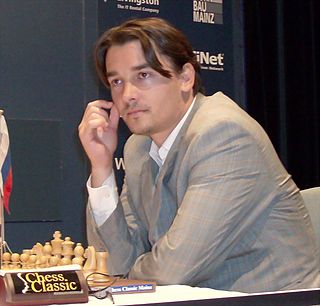A Quote by Benjamin Franklin
Chess teaches foresight, by having to plan ahead; vigilance, by having to keep watch over the whole chess board; caution, by having to restrain ourselves from making hasty moves; and finally, we learn from chess the greatest maxim in life - that even when everything seems to be going badly for us we should not lose heart, but always hoping for a change for the better, steadfastly continue searching for the solutions to our problems.
Quote Topics
Always
Badly
Better
Board
Caution
Change
Change For The Better
Chess
Continue
Even
Everything
Finally
Foresight
Going
Greatest
Hasty
Having
Heart
Hoping
Keep
Learn
Life
Lose
Making
Maxim
Moves
Our
Ourselves
Over
Plan
Problems
Restrain
Searching
Seems
Should
Solutions
Teaches
Us
Vigilance
Watch
Whole
Related Quotes
I love chess, and I didn't invent Fischerandom chess to destroy chess. I invented Fischerandom chess to keep chess going. Because I consider the old chess is dying, it really is dead. A lot of people have come up with other rules of chess-type games, with 10x8 boards, new pieces, and all kinds of things. I'm really not interested in that. I want to keep the old chess flavor. I want to keep the old chess game. But just making a change so the starting positions are mixed, so it's not degenerated down to memorisation and prearrangement like it is today.
By playing at Chess then, we may learn: First: Foresight... Second: Circumspection... Third: Caution...And lastly, we learn by Chess the habit of not being discouraged by present bad appearances in the state of our affairs, the habit of hoping for a favorable chance, and that of persevering in the secrets of resources
Chess holds deep wisdoms of the people. It is truly an image of life, the reflection of human fate that has shown us the earthly way of suffering in darkness and permanent shortage of time. Like in chess, we encounter all kinds of traps, mistakes, settlements, sacrifices, kings, and queens, doubled pawns, and extraordinary moves while we are on the board ourselves.
I started playing chess when I was about 4 or 5 years old. It is very good for children to learn to play chess, because it helps them to develop their mental abilities. It also helps to consolidate a person's character, because as it happens both in life and in a chess game we have to make decisions constantly. In chess there is no luck and no excuses: everything is in your hands.
Like Dvoretsky, I think that (all other things being equal), the analytical method of studying chess must give you a colossal advantage over the chess pragmatist, and that there can be no certainty in chess without analysis. I personally acquired these views from my sessions with Mikhail Botvinnik, and they laid the foundations of my chess-playing life.
I love the competitive aspect of it [business]. It's like playing chess. Why do people play chess? Knowing the realm of moves? Even when you get to be a chess master, there are other chess masters you want to beat or outperform. And to me business is just a sport that I love to compete in; a continuous intellectual challenge that really motivates me.
I used to play a lot of chess and competitive chess and study chess and as you get to the grandmasters and learn their styles when you start copying their games like the way they express themselves through... The way Kasparov or Bobby Fischer expresses themselves through a game of chess is it's astonishing. You can show a chess master one of their games and they'll say "Yeah, that is done by that player."
Well, I kind of split my life into two pieces. One was where my chess career lies. There, I kept my sanity, so to speak, and my logic. And the other was my religious life. I tried to apply what I learned in the church to my chess career too. But I still was studying chess. I wasn't just "trusting in God" to give me the moves.






























